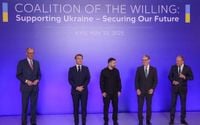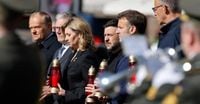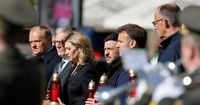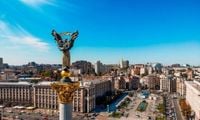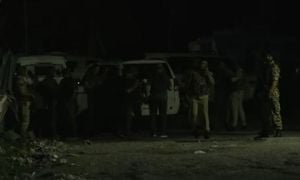On May 10, 2025, a historic gathering took place in Kyiv as European leaders demonstrated their unwavering support for Ukraine amidst ongoing conflict with Russia. French President Emmanuel Macron, German Chancellor Friedrich Merz, British Prime Minister Keir Starmer, and Polish Prime Minister Donald Tusk arrived in the Ukrainian capital to participate in the meeting of the "coalition of the willing," a group formed to provide comprehensive support to Ukraine.
The leaders began their visit at Maidan Nezalezhnosti (Independence Square), a site synonymous with Ukraine's struggle for freedom and democracy. There, they lit candles in tribute to the Ukrainian revolutionaries who lost their lives during the Orange Revolution and the Revolution of Dignity, also known as Euromaidan. This solemn ceremony was marked by the presence of the Ukrainian Armed Forces' representative company and a military orchestra, underscoring the significance of the moment.
As part of their commitment to Ukraine, the leaders issued a joint statement calling for a "complete and unconditional 30-day ceasefire" with Russia. This appeal aligns with a broader initiative to foster dialogue and negotiations aimed at achieving a just and lasting peace. The leaders expressed their solidarity with Ukrainian President Volodymyr Zelensky during a press conference, emphasizing the need for collective action in response to Russian aggression.
"If Moscow continues to block the peace agreement, Europe will increase pressure on it in close coordination with the USA," Macron stated, reinforcing the idea that unity among European nations is essential in the face of ongoing hostilities. The coalition, established on March 2, 2025, at Starmer's initiative, includes 33 countries, primarily from Europe, alongside Australia, New Zealand, Japan, and Turkey. Notably absent from the coalition are the United States, several Balkan nations, Hungary, and Slovakia.
The leaders' visit is particularly poignant as it coincides with the 80th anniversary of the Soviet victory over Nazi Germany, a historical moment that resonates deeply in the context of current geopolitical tensions. In their statements, the leaders reiterated their commitment to supporting Ukraine, with plans to increase pressure on the Russian military until a lasting ceasefire is achieved.
During their time in Kyiv, Macron, Merz, Starmer, and Tusk also engaged in remote discussions with other leaders of the coalition, focusing on the formation of a future coalition that would integrate air, land, and naval forces to help rebuild Ukraine's military capabilities following a potential peace agreement.
"Our response must be collective in the face of Russian aggression," Macron declared, highlighting the importance of coordinated efforts among NATO members and allies. The leaders expressed their determination to push for a ceasefire, stating, "We are ready for a full, unconditional ceasefire on land, in the air, and at sea for at least 30 days, starting on Monday, May 12, 2025." This proposal has already garnered approval from the United States, which has signaled its support for the initiative.
As the leaders moved forward with their discussions, they also took a moment to honor the sacrifices made by Ukrainian defenders in the ongoing war. The tribute at Maidan served as a poignant reminder of the human cost of conflict and the resilience of the Ukrainian people.
In a significant development, U.S. President Donald Trump reaffirmed his administration's commitment to peace talks, echoing calls for a ceasefire and warning of severe sanctions against Russia should it reject the proposal. Trump's involvement reflects the intertwined nature of U.S. and European diplomatic efforts in addressing the crisis.
The "coalition of the willing" not only aims to provide immediate military support but also seeks to establish a long-term security framework for Ukraine. This includes ensuring a steady supply of arms and resources to bolster Ukraine's defense capabilities. The coalition's formation allows NATO members to act collaboratively outside the formal alliance structure, thus circumventing potential vetoes from countries hesitant to engage militarily.
As the situation evolves, Macron and his counterparts remain vigilant, ready to adapt their strategies in response to Russia's actions. "Our unity is our strength," Macron emphasized, reiterating the necessity of a united front against any attempts to undermine Ukraine's sovereignty.
The visit to Kyiv marks a critical moment in the ongoing conflict, symbolizing a renewed commitment from European leaders to stand by Ukraine in its fight for independence and territorial integrity. As the leaders departed, they left behind a message of hope and solidarity, one that resonates deeply with the people of Ukraine as they continue to navigate the challenges posed by external aggression.
The coalition's efforts are expected to continue, as discussions about future military support and peace negotiations remain at the forefront of international diplomatic efforts. The world watches closely as Ukraine, bolstered by the support of its allies, strives for peace and stability in a region fraught with uncertainty.
